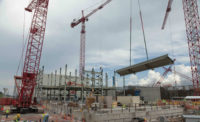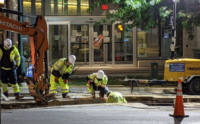In the first round of what is bound to be a longer battle over a $900-million bridge project payment claim, a state supreme court judge has partly rebuffed the design-build contractor's initial quest for a more rapid release of documents held by the New York State Thruway Authority.
The consortium, Tappan Zee Constructors, opened a pedestrian walkway June 15 on the Mario M. Cuomo Bridge. It is the final piece of a fixed-price project that replaced the aging Tappan Zee Bridge and opened the new bridge to vehicle traffic in 2018. The heavily used bridge crosses the Hudson River about 15 miles north of New York City.
But the Fluor Corp.-led consortium informed the court two weeks earlier that it is appealing Judge Peter Lynch's failure to award it attorneys' fees on the document-related issues.
The consortium had claimed in its lawsuit filed last November that the agency's slow pace of releasing the documents, sought under a state freedom-of-information law, amounted to an effort to keep them private—or what the consortium's lawyer considered "constructive denial" of the request.
In a March ruling, Lynch wrote an opinion saying that the pace in providing the documents did constitute an illegal delay by failing to set a certain date for turning over the material.
But in the next section of his ruling, the judge said the Authority had rendered the "constructive denial" issue moot because it had issued in a timely manner monthly letters advising Tappan Zee Constructors of the status of its ongoing record search. The agency also had delivered 10,600 pages of material, he wrote.
According to Tappan Zee Constructors, Lynch’s decision amounted to a victory for the consortium, in which it “substantially prevailed,” although "the Court did allow [the Authority] additional time to produce requested documentation."
The consortium said it "has filed a notice of appeal to preserve our right to recover attorneys’ fees."
The final price of the bridge may figure in a sensitive determination of tolls for motorists. The Authority has held hearings on the topic but has not yet announced a new toll to take effect in 2021 or later.
Document production is a critical phase in any litigation, say legal experts.
Tappan Zee Constructors alleged that the Authority violated state public disclosure law by impeding for about 18 months its access to records for the 3.1-mile, twin-span bridge.
The agency “has intentionally delayed producing the requested records to frustrate [the consortium's] ability to advance claims that it has made … and is attempting to resolve pursuant to [the project] contract’s dispute resolution provisions,” said the consortium's lawsuit.
Tappan Zee Constructors contended that since April 2018, “on a monthly basis, [the agency] has unilaterally extended its time to respond, without objecting to producing a particular document or category of documents … or otherwise providing any specific basis to deny all or part of the request.”
Among documents sought by Tappan Zee Constructors are records of 2016, 2017 and 2018 project budgets, 2016 and 2017 state funding, contingency amounts in agency budgets, and agency-to-state comptroller correspondence on payment requests.
The consortium has also sought a wide array of other documents and data, such as the Authority's correspondence with a project consultant, information regarding delays in the demolition of one of the existing bridge's central sections and accidents involving boat operators colliding with project barges. Those accidents led to three deaths on a tugboat crew and two passengers on a civilian motorboat.
The consortium’s lawsuit acknowledges receiving “partially redacted” documents but says the authority “has delayed review and resolution of … claims.”
In February, the consortium's attorney submitted a chart showing more than 100 documents produced so far, but many other requests still were pending. The attorney claimed in an affidavit that the authority had waited more than 18 months to "make an initial production, and the number of documents that have been produced are minimal."
The Authority declined comment but had previously called the suit "a negotiating tactic."





Post a comment to this article
Report Abusive Comment